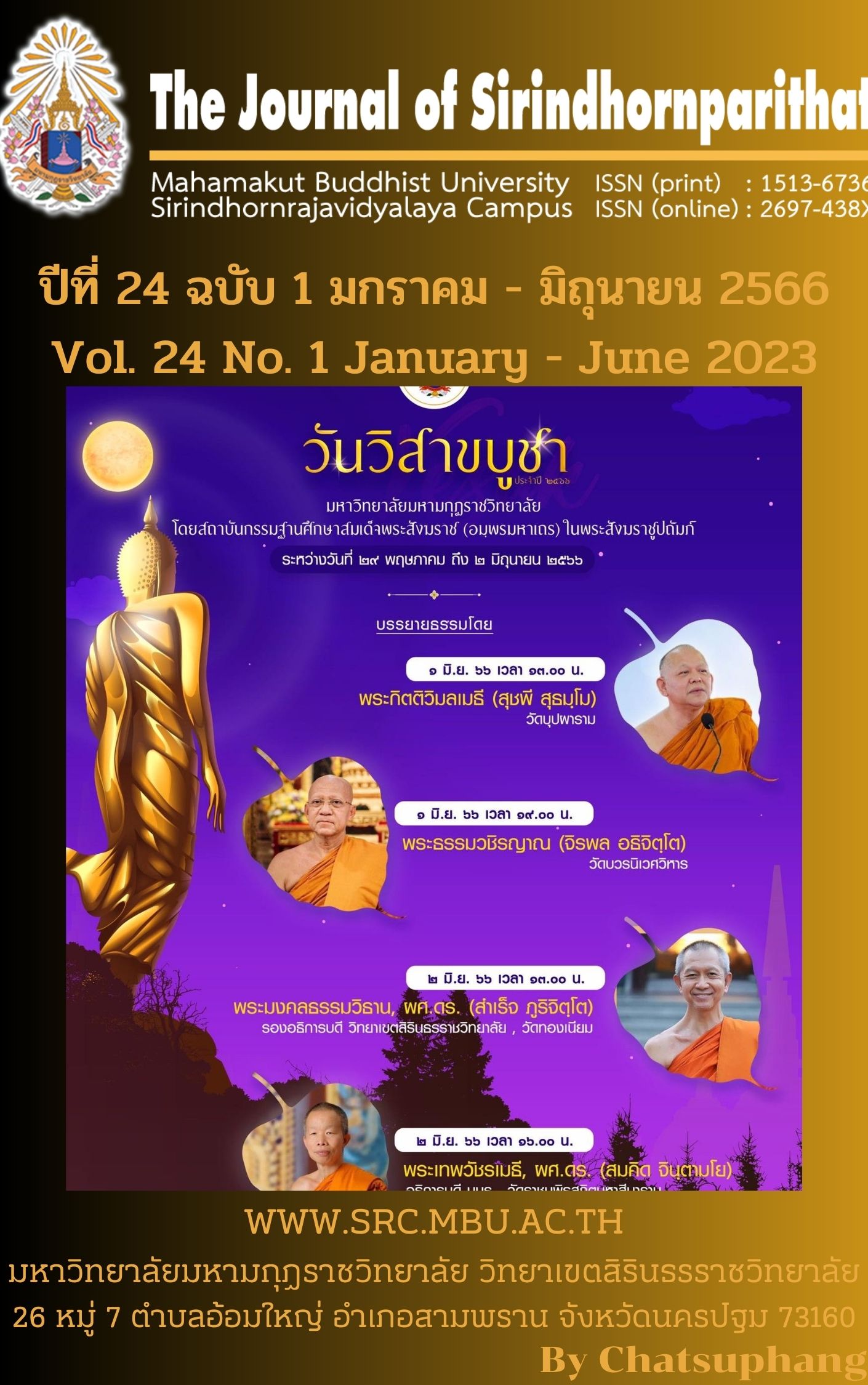Enhancing Honest Culture and Anti-Corruption to Youth under the Concept “No Cheating”
Keywords:
Enhancing, Honest Culture, Anti-Corruption, YouthAbstract
The objectives of this research were: 1) To study the culture, values of honesty and anti-corruption, 2) To study the promotion of culture, values of honesty and anti-corruption, and 3) To study guidelines for enhancing culture and values of honesty and anti-corruption to citizens of youth in Trang Province by Lokapaladhamma.Methodology was the mixed method; the qualitative research data were collected from 18 key informants. and The quantitative research, data were collected from 384 samples, with questionnaires and the data were analyzed by descriptive statistics; frequency, percentile, mean and standard deviation.
The results of the study found that:
1. The culture, values of honesty and Anti-Corruption of Youth under the Concept of “Growing up Without Cheating” of youth in Trang province overall, it was at a high level. it was found that: Honesty, Sufficiency, Responsible action, and Social fairness respectively. 2. Factors affecting fostering a culture of honesty and anti-corruption among youth Overall, it's at a high level, as follows: Family institutional factors, Educational institutions, Community and group of friends, Mass media and The lowest mean was Religious, respectively, where all 5 factors could jointly explain the variation in The culture, values of honesty and Anti-Corruption of Youth Under the Concept of “Growing Up Without Cheating” of youth in Trang province following a honesty and Anti-Corruption of Youth (Y) by 44.6.3. Guidelines for fostering youth culture and values of honesty and anti-corruption. The family institution by Parents treat the youth as a role model for living sufficiency. Educational institutions teach in activities for youth to participate to have public responsibility, sacrifice, know how to give. Friends and Community who admonishes, advises, knows, considers. The mass media promotes youth by presenting who are honest, and Religious Institute by a moral teacher monks in the community Create roles for teaching, training, and Preaching to impress the youth may use language according to youth, on important Buddhist days or special, etc.
References
ข้อมูลด้านการศึกษาจังหวัดตรัง. (2565). [ออนไลน์] แหล่งข้อมูล https://drive.google.com /file/d/ 1kh67AGQMCqhfMl03vuT66mknGl-vQFt0/view [15 มกราคม 2565].
จิตรัตนาภรณ์ เวียงพล และคณะ. (2561). “การศึกษาคุณลักษณะอันพึงประสงค์ของนักเรียน เครือข่ายเมืองเชียงขวัญ สังกัดสำนักงานเขตพื้นที่การศึกษาประถมศึกษาร้อยเอ็ด เขต 1”. วารสารมหาวิทยาลัยมหามกุฏราชวิทยาลัย วิทยาเขตร้อยเอ็ด. 7(1) : 12-23.
ฐิตินัน บุญภาพ คอมมอน. (2556). “บทบาทของสื่อใหม่ในการสร้างค่านิยมทางสังคม และอัตลักษณ์ของเยาวชนไทยในเขตกรุงเทพมหานคร”. รายงานการวิจัย. รายงานนี้ได้รับทุนอุดหนุนจากศูนย์วิจัย มหาวิทยาลัยธุรกิจบัณฑิตย์ฐ.
ดวงกมล ทองอยู่. (2555). “แนวทางการพัฒนาการเห็นคุณค่าในตนเองของวัยรุ่นตามทฤษฎีการรับรู้ความสามารถของตน”. วารสารวไลยอลงกรณ์ปริทัศน์. 4(2) : 14-15.
ธัญญารัตน์ แก้วตะพาน. (2564). “การพัฒนารูปแบบการจัดการเรียนรู้ EACDE MODEL ในสาระศาสนา ศีลธรรม จริยธรรม ที่ส่งเสริมคุณลักษณะอันพึงประสงค์ของผู้เรียนชั้นมัธยมศึกษาปีที่ 2”. วารสารวิชาการศรีปทุม ชลบุรี. 17(3) : 79-91.
แผนปฏิบัติการ ด้านการต่อต้านการทุจริตและประพฤติมิชอบ ระยะที่ 1 (พ.ศ. 2563 – 2565).
พงษ์เมธี ไชยศรีหา. (2561). “แนวทางการพัฒนาวัฒนธรรมทางการเมืองประชาธิปไตยของประชาชนในเขตเทศบาลเมืองชุมแพ จังหวัดขอนแก่น”. วารสารสถาบันวิจัยและพัฒนา มหาวิทยาลัยราชภัฏมหาสารคาม. 5(2) : 105-118.
พรพรรณ มากบุญ. (2556). “ปัจจัยที่มีอิทธิพลต่อทักษะทางสังคมของเด็กและเยาวชนชายในศูนย์ฝึกและอบรมเด็กและเยาวชนเขต 2 จังหวัดราชบุรี”. วารสารวิทยบริการ. 24(4) : 114-125.
ภมรรัตน์ ชุมภูประวิโร และคณะ. (2561). “การปลูกฝังความสุจริตของเยาวชนในสามจังหวัดชายแดนใต้”. รายงานการวิจัย. สถาบันวิจัยพุทธศาสตร์ : มหาวิทยาลัยมหาจุฬาลงกรณราชวิทยาลัย.
รุ่งฤดี กล้าหาญ และคณะ. (2558). “การพัฒนารูปแบบการวัดและประเมินพฤติกรรมเพื่อเสริมสร้างคุณลักษณะอันพึงประสงค์ของนักเรียนชั้นประถมศึกษาตอนปลายของไทยในศตวรรษที่ 21”. รายงานการวิจัย. สถาบันทดสอบทางการศึกษาแห่งชาติ (องค์การมหาชน).
ศิริสุข นาคะเสนีย์ และคณะ. (2558). “ปัจจัยที่มีอิทธิพลต่อพฤติกรรมจิตสาธารณะของนักศึกษาคณะศิลปศาสตร์ มหาวิทยาลัยเทคโนโลยีราชมงคลรัตนโกสินทร”. วารสารวิจัยรำไพพรรณี. 9(1) : 80-90.
หทัยกาญจน์ ตรีสุวรรณ. (2564). 2 ปีประกาศใช้ รธน. : สำรวจสิ่งที่ กรธ. คิด กับสิ่งที่เกิดขึ้นจริงในสนามเลือกตั้ง 2562. https://www.bbc.com/thai/thailand-47828666 [15 มกราคม 2564].

Downloads
Published
Issue
Section
License
Copyright (c) 2023 Mahamakut Buddhist University

This work is licensed under a Creative Commons Attribution-NonCommercial-NoDerivatives 4.0 International License.
บทความที่ได้รับการตีพิมพ์เป็นลิขสิทธิ์ของ มหาวิทยาลัยมหามกุฏราชวิทยาลัย วิทยาเขตสิรินธรราชวิทยาลัย
ข้อความที่ปรากฏในบทความแต่ละเรื่องในวารสารวิชาการเล่มนี้เป็นความคิดเห็นส่วนตัวของผู้เขียนแต่ละท่านไม่เกี่ยวข้องกับหาวิทยาลัยมหามกุฏราชวิทยาลัย วิทยาเขตสิรินธรราชวิทยาลัย และคณาจารย์ท่านอื่นๆในมหาวิทยาลัยฯ แต่อย่างใด ความรับผิดชอบองค์ประกอบทั้งหมดของบทความแต่ละเรื่องเป็นของผู้เขียนแต่ละท่าน หากมีความผิดพลาดใดๆ ผู้เขียนแต่ละท่านจะรับผิดชอบบทความของตนเองแต่ผู้เดียว



